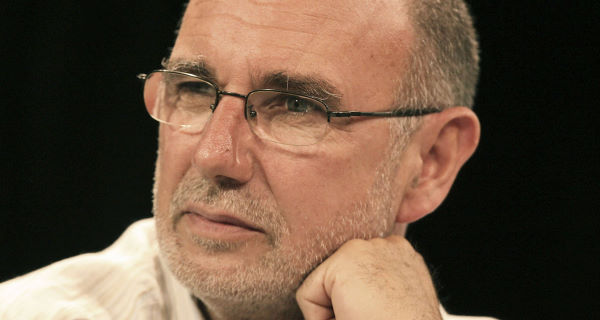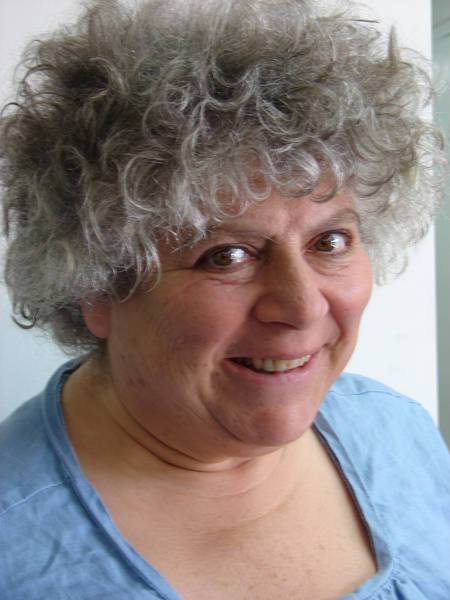Signing the boycott pledge

Mike Leigh, film maker and one of the first to sign the pledge and letter.
We support the Palestinian struggle for freedom, justice and equality. In response to the call from Palestinian artists and cultural workers for a cultural boycott of Israel, we pledge to accept neither professional invitations to Israel, nor funding, from any institutions linked to its government until it complies with international law and universal principles of human rights.
Why I signed the the artists’ pledge for Palestine
Writers and artists boycott Israeli institutions
By Kamila Shamsie, Guardian and Artists for Palestine UK
February 14, 2014
It doesn’t take long in the West Bank and Jerusalem to work out that ‘apartheid’ is the only word that will do. It is present in the extensive infrastructure of military might, 3G phone coverage (not allowed to Palestinian mobile providers), and no-Arabs-permitted bus routes that cater to settlers in the West Bank whose presence there is illegal. It is present in the implementation of laws that make it virtually impossible for Palestinian residents of Jerusalem to acquire residence permits for their spouses from the West Bank and Gaza. It is present in the security checkpoint in the middle of a once-busy market street in Hebron where Israeli guards inspect your paperwork to make sure you aren’t Palestinian – absolutely everyone else is allowed through. It is present, most starkly, in the Separation Wall.
Other forms of apartheid exist, of course, starting with the gender apartheid of Saudi Arabia. But the rest of the world is placed in a unique position vis a vis Palestine, as it previously was vis a vis South Africa, because the call to participate in the BDS (Boycott, Divestment and Sanctions) movement comes from inside Palestinian civil society. No comparable call has been made by the women of Saudi Arabia, the Baloch of Pakistan, the Kashmiris under Indian occupation etc. It is the ‘boycott’ part, as it applies to culture and academia, that seems to cause the most unease. Even so, more than 700 artists, including Mike Leigh, Kate Tempest, Gillian Slovo, Brian Eno, Alexei Sayle have signed a pledge to accept neither invitation nor funding from any institution linked to the Israeli government until Israel complies with international law and principles of human rights. I don’t know how many of those 700 plus stand by the broader principles of BDS, but certainly quite a number do – including me. It’s worth pointing out that BDS has refined the South African principles of boycott and doesn’t targets individual artists according to the content of their work, the beliefs they espouse, or any domestic sources of funding they utilise. It is when Israelis use state funding to travel abroad that BDS kicks in. It isn’t culture per se but the use of culture as a propaganda tool by the Israeli government that BDS targets.
The Israeli activist Ofer Neiman, from the group Boycott from Within, recently participated in a boycott discussion in London and read out parts of a contract, revealed by the Israeli poet Yitzhak Laor in 2008, that Israeli artists who accepted state funding to travel abroad were required to sign. It included such clauses as ‘The service provider is aware that the purpose of ordering services from him is to promote the policy interests of the State of Israel via culture and art.’ Within the Israeli Ministry of Foreign Affairs there is a department responsible for ‘attaining prominence and high exposure abroad for Israel’s cultural and scientific activity, as an important tool for the promotion of its political interests.’ Taking the line that artists who accept Israeli state funding abroad should be allowed to be kept out of politics starts to look a little ridiculous in the face of all this.
Neiman’s voice is, of course, also an important one for its reminder that a nation is distinguishable from its government – you may hold the strongest of ties with the former while de-linking yourself from the latter. Ultimately for me it comes down to this: if a beleaguered civil society asks you to participate in non-violent pressure tactics that have proved successful elsewhere, on what grounds do you refuse?
Kamila Shamsie has written the forward to The Case for a Cultural Boycott of Israel


Above, Kamila Shamsie, L, and Ann Jungman.
Over 100 artists announce a cultural boycott of Israel
Letter, The Guardian
February 15, 2015
Along with more than 600 other fellow artists, we are announcing today that we will not engage in business-as-usual cultural relations with Israel. We will accept neither professional invitations to Israel, nor funding, from any institutions linked to its government. Since the summer war on Gaza, Palestinians have enjoyed no respite from Israel’s unrelenting attack on their land, their livelihood, their right to political existence. “2014,” says the Israeli human rights organisation B’Tselem, was “one of the cruellest and deadliest in the history of the occupation.” The Palestinian catastrophe goes on.
Israel’s wars are fought on the cultural front too. Its army targets Palestinian cultural institutions for attack, and prevents the free movement of cultural workers. Its own theatre companies perform to settler audiences on the West Bank – and those same companies tour the globe as cultural diplomats, in support of “Brand Israel”. During South African apartheid, musicians announced they weren’t going to “play Sun City”. Now we are saying, in Tel Aviv, Netanya, Ashkelon or Ariel, we won’t play music, accept awards, attend exhibitions, festivals or conferences, run masterclasses or workshops, until Israel respects international law and ends its colonial oppression of the Palestinians. To see the full list of supporters, go to artistsforpalestine.org.uk.
Caryl Churchill, Jimmy McGovern


Peter Kosminsky*, Mike Leigh*, Jimmy McGovern, Phyllida Lloyd, Max Stafford-Clark, Will Alsop OBE, John Berger, Miriam Margolyes*, Maggie Steed, Riz Ahmed, Anna Carteret, Jeremy Hardy, Brian Eno, Richard Ashcroft, Gillian Slovo*, China Miéville, Aminatta Forna, Hari Kunzru, Liz Lochhead, Hanan Al-Shaykh, Peter Ahrends, David Calder, Caryl Churchill, Sacha Craddock, Selma Dabbagh, Ken Loach, Roger Michell, April De Angelis, Andy de la Tour, Mike Hodges, Rachel Holmes, Ann Jungman*, Kika Markham,


Miriam Margolyes and Julien Temple
Simon McBurney, Andrew O’Hagan, Courttia Newland, Michael Radford, Lynne Reid Banks*, Kamila Shamsie, Alexei Sayle*, Roger Waters, Mark Thomas, Susan Wooldridge, Laura Mulvey, Pauline Melville, Khalid Abdalla, Bidisha, Nicholas Blincoe, Leah Borrromeo, Haim Bresheeth*, Victoria Brittain, Niall Buggy, Tam Dean Burn, Jonathan Burrows, Taghrid Choucair-Vizoso, Ian Christie, Liam Cunningham, Ivor Dembina*, Shane Dempsey, Patrick Driver, Okin Earl, Leon Rosselson*, Sally El Hosaini, Paul Laverty, Eyal Sivan, John Smith, Mitra Tabrizian, Siobhan Redmond, Ian Rickson, Tom Leonard, Sonja Linden*, David Mabb, Rose Issa, Gareth Evans, Alisa Lebow, Annie Firbank, James Floyd, Jane Frere, Kadija George, Bob Giles, Mel Gooding, Tony Graham*, Penny Woolcock, Omar Robert Hamilton, James Holcombe, Adrian Hornsby, John Keane, Brigid Keenan, Hannah Khalil, Shahid Khan, Sabrina Mahfouz, Sarah McDade, Jonathan Munby, Lizzie Nunnery, Rebecca O’Brien, Timothy Pottier, Maha Rahwanji, Ravinder Randhawa, Leila Sansour, Seni Seneviratne, Anna Sherbany*, Eyal Sivan, Kareem Samara, Cat Villiers, Esther Wilson, Emily Young, Andrea Luka Zimmerman, Jeremy Page, Sarah Streatfeild, Colin Darke, Russell Mills, Elaine Di Campo, Treasa O’Brien
* JfJfP signatory
